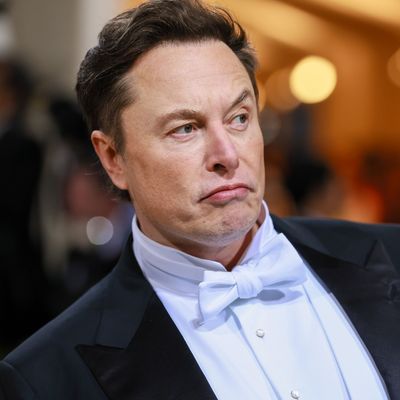
Update: Several hours after this post was published, Musk did indeed try to pull out of the deal, and Twitter’s board said they would see him in court.
Elon Musk has never lacked for ambition. Reaching Mars, saving the environment with lithium-ion engines, building massive networks of underground tunnels, and making Star Trek–like brain implants — Musk is who he is because his goals probably won’t happen during his lifetime. He’s proudly insatiable, opting for bigger and less attainable goals, and this is a big part of what makes him a figure beloved and reviled in about equal measure.
But then there’s Twitter. Back in April, the world’s richest man clinched a $44 billion deal to take over the social-media site, which he has used as a tool for spreading dumb jokes and committing securities fraud. It was a corporate coup that put him on the path of power and influence in media, technology, and industry like few others before him. But ever since he got what he wanted, Musk has been the biggest oppositional force to the deal going through. (Twitter shares are currently trading around $37, more than 30 percent below the $54.20 weed-joke price that Musk offered). His excuse is that there are spambots, which make using Twitter annoying, and that there are more of them than the company lets on. And he is basically right. But whether or not it’s enough to get out of the deal remains to be seen.
Yesterday, the Washington Post reported that Musk has stopped engaging in talks to fund the deal with other investors because of the number of bots, and it certainly looks like he’s really trying to back out of it or at least negotiate the deal through the press. (Why didn’t he do this before he agreed to buy the company? Essentially, he didn’t bother with doing due diligence). Some context: Musk had been in a back-and-forth with the Twitter board over the amount of data he had access to, and last month, the board finally caved and let Musk — who surely has other things to do — parse through billions of tweets to weed out which ones were fake and which were legit. For what it’s worth, Twitter claims that bots make up less than 5 percent of monetizable daily active users — but that is a metric they made up and get to privately define, so it doesn’t really tell you anything. After a month, Musk’s people’s “doubts about the spam figures signal they believe they do not have enough information to evaluate Twitter’s prospects as a business,” according to the Post.
There’s something wrong here. At first glance, this doesn’t make a lot of sense. He got, literally, every tweet. If Musk got all the information that he asked for, how could he still be lacking the data to figure out the deal with the bots? As was pointed out by Bloomberg’s Matt Levine, the patron saint of Musk explainers, his June demand for data was probably about forcing the board to adhere to legal covenants, the agreements between two parties who’ve entered into a deal. And saying again that he doesn’t have enough data could be another attempt at the same strategy to delay or pressure the board to change the terms of the deal.
But there are a lot of people who think this is part of a larger ploy to abandon the deal altogether. Josh Wolfe, a co-founder of the investment fund Lux Capital, believes that the whole plan to buy the company was a charade that allowed Musk to cash out a bunch of Tesla stock at the top of the market:
The $1 billion breakup fee here is part of the April agreement between Musk and Twitter. But Musk can’t just pay a fee and walk away — it only applies if regulators scuttle the deal, which isn’t happening, or if there’s fraud or some other major problem.
The upshot here is that, whether or not Musk wants to wriggle out of the deal, there is a contract he signed that holds him to the terms he agreed to. Here’s Levine again, with as much palpable frustration as you could get in a tweet about a corporate takeover agreement:
All true. And Musk surely knows this, or at least his lawyers do. Maybe Musk is just trying to lower the price of the deal so that he doesn’t have to leverage most of his personal fortune to buy a company he seemingly no longer wants. But the thing is, it might not matter what Musk says. Twitter’s board has no reason to lower the price or change any other terms of the deal. They represent the shareholders, and getting billions of dollars more for the company than what it’s currently worth would definitely show that they’re doing a good job. The next step may be court, but by now, you would have expected a coherent preview of a legal strategy that Musk & Co. would argue before a judge. Maybe, though, this is just another impossible dream for Musk — sure, anybody rich enough can buy a company, but only I can get out of it. This may be one urge, however, that Musk isn’t able to fulfill in his lifetime.






























